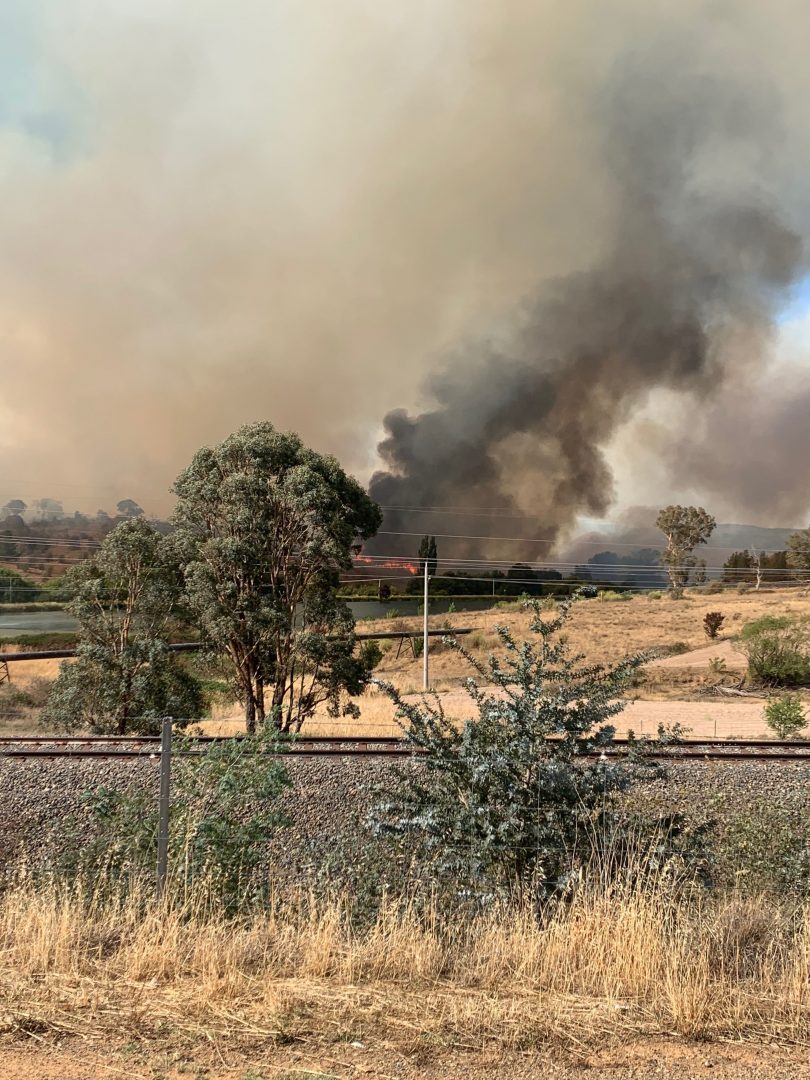
Canberrans were covered in smoke from bushfires both locally and interstate during Black Summer. Photo: Region.
Sunburn may be an obvious risk when heading outside this summer, but ACT Health Services has voiced concerns about heat and air quality as the weather warms up.
The Bureau of Meteorology (BoM) has released its long-range forecast, with current climate drivers and recent conditions pointing to an increased risk of heatwaves and bushfires this year.
Senior meteorologist Sarah Scully said the forecast showed a high chance for unusually warm temperatures for most of Australia – including the Capital region – until at least February 2024.
“Daytime and night-time temperatures have an increased chance of being unusually warm for October to February,” Ms Scully said.
“Warm nights after hot days give us little chance to cool down and heat stress can be a significant risk to health.”
A declared El Niño and positive Indian Ocean Dipole (IOD) mean there’s also an increased bushfire risk for much of eastern and southern Australia due to reduced rainfall, high fuel loads and above-average temperatures.
This is in contrast to the La Niña and negative IOD the country has experienced for the past three years.
“There is always a risk of dangerous and destructive fires in Australia at this time of year,” Ms Scully said.
“[This season] grass growth, due to above average rainfall in the past two to three years, is contributing to an increased fire risk.”
The BoM developed its heatwave service in October 2022, which will issue warnings of extreme heat at 3 pm each day when one is needed.
The impacts of heat cannot be overstated, as both heat injuries and illness can be life-threatening.
ACT Ambulance Service Acting Chief Officer Greg Brown said everyone was at risk, but certain population groups carried a higher risk.
“Those who are very young might be oblivious to the risk, while those who are older might not hear the warning in the first place. People with pre-existing medical conditions and those persons who are pregnant carry a higher risk during summer during their physiological changes,” he said.
“Let’s not forget about our loved ones from non-English [speaking] backgrounds who might not be privy to the same level of information as the rest of Canberra.”
Signs of a heat injury or illness include dizziness, lightheadedness, headache, loss of appetite, difficulty concentrating, nausea or vomiting and muscle cramps.
Mr Brown said thirst wasn’t a good indicator of heat injury because if you’re thirsty you’re already dehydrated.
“Water is your best friend – avoid drinks that contain sugar or alcohol, or coffee and caffeine in general, as they will dehydrate you further,” he said.
Along with keeping hydrated, other ways to mitigate the risk of heat-related injury or illness include avoiding outdoor activity in the peak of the day, monitoring work time in the sun and taking regular breaks in the shade, wearing loose-fitting clothing and a broad-brimmed hat, and wearing high SP-level sunscreen.
Alongside heat, air quality impacts from smoke and pollen are being considered throughout spring and summer.
New guidance and recommendations around air quality categories will be rolled out nationally next month, but ACT Chief Health Officer Dr Kerryn Coleman urged all Canberrans to educate themselves now.
“The biggest public health risk we’re likely facing this season is not COVID, but it’s likely to be our air quality issues due to both dust and smoke in the air, particularly combined with those hot, windy days, as well as heat,” she said.
Since the smoke impacts of the 2019/2020 Black Summer bushfires, ACT Health has been focusing on how to help the community prepare for air quality issues.
It has since developed air quality categories for particulate matter 2.5 (PM2.5), which are small, solid particles and liquid droplets suspended in the air, including dust, pollen and organic chemicals.
During bushfires or dust storms, particle pollution can reach extremely high concentrations, and PM2.5 are so small it can get deep into the lungs and bloodstream.
Given the dangers of particulate matter in the air, Dr Coleman urged people susceptible to air quality changes, or those caring for people with related health conditions, to get in touch with their regular health provider within the next month.
“Make sure your action plan is up-to-date, make sure your medications are all timely, up-to-date and easily accessible,” she advised.
“Know if the heat is going to have an impact on how your medications work, know if you need to change your fluid intake or diet intake … We really need you to have a plan and to know exactly what you’re going to do if the air quality does deteriorate.”
If someone is experiencing heat stress, try to get them into a cooler environment and lay them down. Cool them by applying cool, wet towels to their neck and underarms, and offer cool fluids (preferably water) to drink. Visit a GP or walk-in clinic.
A person being drowsy or unconscious, accompanied by hot and dry skin, indicates heat stroke. Call Triple Zero (000) immediately and ask for an ambulance.












